Zulu Blu-ray Movie
HomeZulu Blu-ray Movie 
Limited Edition to 3000 - SOLD OUTTwilight Time | 1964 | 138 min | Not rated | Jan 22, 2014
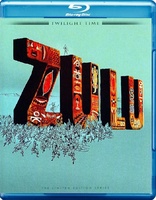
Movie rating
7.8 | / 10 |
Blu-ray rating
| Users | 4.2 | |
| Reviewer | 3.5 | |
| Overall | 3.9 |
Overview
Zulu (1964)
Based on the 1879 massacre in Africa, British soldiers stand fast against the Zulu's at Rorke's Drift.
Starring: Stanley Baker, Jack Hawkins (I), Ulla Jacobsson, James Booth (I), Michael CaineNarrator: Richard Burton
Director: Cy Endfield
| War | 100% |
| History | 85% |
| Drama | 71% |
Specifications
Video
Video codec: MPEG-4 AVC
Video resolution: 1080p
Aspect ratio: 2.35:1
Original aspect ratio: 2.35:1
Audio
English: DTS-HD Master Audio 2.0 (48kHz, 24-bit)
English: DTS-HD Master Audio Mono (48kHz, 24-bit)
Music: DTS-HD Master Audio 2.0 (48kHz, 24-bit)
Subtitles
English SDH
Discs
50GB Blu-ray Disc
Single disc (1 BD)
Playback
Region free
Review
Rating summary
| Movie | 4.5 | |
| Video | 3.5 | |
| Audio | 4.0 | |
| Extras | 2.0 | |
| Overall | 3.5 |
Zulu Blu-ray Movie Review
Africa screams.
Reviewed by Jeffrey Kauffman January 29, 2014The sixties was an era of the big budget historical epic, as major studios tended to (with certain exceptions) shy away from the Biblical fodder that had been a major part of the fifties. David Lean outings like Lawrence of Arabia, Doctor Zhivago and Ryanís Daughter (could we please have this underappreciated gem on Blu-ray?) are probably the best examples of this trend, but the decade is full of other such gargantuan productions, including the film that nearly sank 20th Century Fox, Cleopatra. Itís perhaps a little odd, then, that 1964ís Zulu isnít better remembered, even given the fact that it was produced on a budget that would barely cover a Hollywood extravaganza's craft services. Make no mistakeóthe film has a very devoted following, fans that either saw it in its original theatrical exhibition or who caught it later in any of its many television broadcasts. But the film never seems to be regularly mentioned in the same breath with other massive historical epics of this same era. Some of this lack of recognition may be due to its subject matter (more about that in a moment), which is unusual and perhaps less familiar to some on this side of the pond, or even to the fact that this was a British production to begin with. This paucity of attention seems even more peculiar when one realizes that Zulu provided Michael Caine with his first notable starring appearance, and that the film features a distinctively literate script that addresses some of the more troubling issues of British Imperialism. And itís in this aspect that Zulu may find a certain resonance with American audiences, despite the fact that many may not be overly familiar with the history of the Zulus or in fact their interactions with the British in the 19th century. But those of us who were raised in the United States have been made only too aware of our particular inherited peccadilloes, whether they be the wresting of land from indigenous peoples (something thatís quite relevant with regard to this particular film), or the horrors of slavery. In a kind of ironic sense, Americans havenít had to deal with imperialistic faux pas quite as much as the British, at least not during the era depicted in the film. But there are certainly cogent lessons to be learned from Zuluís depiction of a supposed David versus Goliath interchange where both antagonists suffer incredible damage but where a certain intrinsic honor ends up being more important than who is the ultimate victor.
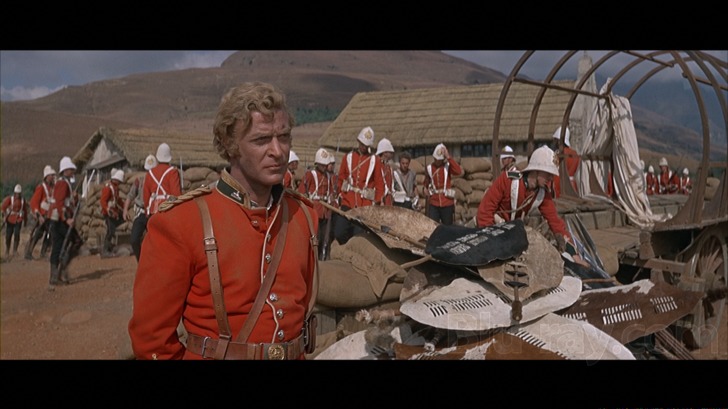
As I discussed in our Sands of the Kalahari Blu-ray review, Cy Endfieldís name, much like Zulu itself, isnít mentioned all that often nowadays, despite the fact that the exiled American managed to bring several high profile films to the big screen (including Mysterious Island). Zulu was in a way Endfieldís most personal production. He had read an article by John Prebble about the battle between the Zulu and the British at Rorkeís Drift in South Africa in 1879 and thought that the subject was perfect fodder for the then trendy historical epic film. Endfield co-wrote the adaptation (along with original author Prebble), co-produced the film (with co-star Stanley Baker) and directed it. Perhaps Endfieldís expat perspective is at least one reason why Zulu is surprisingly forward thinking in how it details the various prejudices and social compacts of the British and their imperialistic ambitions which led them into conflict with the Zulus.
The film starts with a devastating tracking shot that shows the British having gotten the short end of the Zulu spear in an attack that has left a battlefield strewn with English corpses. We segue to a Zulu tribal ceremony where Swedish missionary Otto Witt (Jack Hawkins) and his pretty daughter Margareta (Ulla Jacobsson) are in attendance. Things get a bit dicey for the pair when a runner arrives to tell the Zulu King about the incredible victory the tribe has just achieved. This scene immediately details the precarious relationships between outsiders and the Zulus, one which is friendly to a certain point, but which is also fraught with peril.
Zulu is in fact remarkably evenhanded in detailing the heroism on both sides of this particular battle, though chances are most, though having more in common with the British, may in fact be rooting for the Zulus, if only because they seem primitive. That illusion is quickly dispelled as the film depicts not only their overwhelming numbers in attacking the British, but also some of their superior strategizing. The film still maintains a focus on the British soldiers fighting the Zulus, as personified by two initial nemeses, Lieutenant John Chard (Stanley Baker), a working class engineer, and Lieutenant Gonville Bromhead (Michael Caine), an upper crust sort given to calling Chard ďold boyĒ. While there is quite a bit of time given over to various character beats (including some comedy relief courtesy of a subordinate played by James Booth), the film really fulfills its potential in its spectacularly staged battle sequences.
There is a sociopolitical subtext running through Zulu, but itís never hyperbolized to the level of a screed. The film can actually be enjoyed (if thatís even a fitting word) as a portrayal of heroism under daunting odds, but Endfield and Prebble donít really shirk from what is motivating the Zulus to go on the attack in the first place. Zulu has slowly attained a significant cult status in the United States over the years (interestingly, the film was extraordinarily successful in most European markets at the time of its release), and itís one of those rare historical pieces which seems all the more relevant today as many superpowers have to confront how they interact with indigenous populations.
Zulu Blu-ray Movie, Video Quality 

Zulu is presented on Blu-ray with an AVC encoded 1080p transfer in 2.35:1. There has been a lot of response to this release, and to comparisons with the (region free) British release reviewed by my colleague Dr. Svet Atanasov. The British release itself has been the subject of some considerable controversy, with some averring it's near perfect while others insist the release has had over aggressive denoising applied. Without getting into that particular can of worms, I will say that to my eyes the British release has moderately though noticeably more accurate looking color (compare, for example, the reds of the British military jackets, which in this domestic release are near orange). The element used for this transfer also has minimally (and I do mean minimally) more damage, with occasional small flecks showing up. There is a fine layer of grain on this release which may prove to be more palatable to those with a low tolerance for DNR. On the other hand, there appears to have been some sharpening done to this release, which results in noticeable ringing, especially in scenes with a brightly backlit sky. There's also some nominal flicker, though not quite at the levels which I personally found quite distracting in isolated moments of Khartoum. Fine detail is very good on this release, especially in close-ups.
Zulu Blu-ray Movie, Audio Quality 
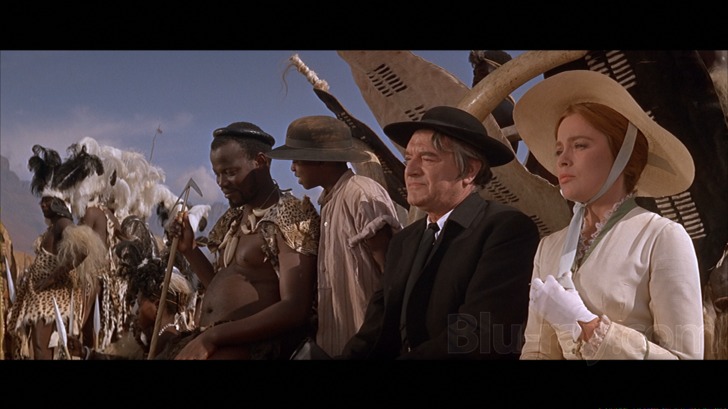
Zulu features two audio basic options, DTS-HD Master Audio Mono and DTS-HD Master Audio 2.0 (there's also an isolated score track, as is mentioned below in the audio section of the review). While the mono track corrals John Barry's expansive score, it features excellent fidelity that offers great prioritization of dialogue, effects and the music. The 2.0 mix features some surprising directionality (especially with regard to some panning effects), and also gives Barry's music more breathing room, but it also has occasional out of phase elements which add a slightly processed sound. Both tracks have fairly fulsome midranges, though some might wish for some more pronounced lower frequencies, especially in the battle scenes.
Zulu Blu-ray Movie, Special Features and Extras 
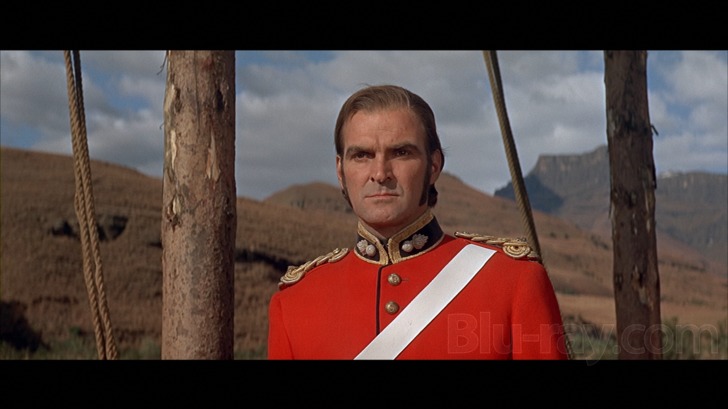
- Audio Commentary with Lem Dobbs and Nick Redman. Dobbs contributes another really nicely done commentary, aided by Redman. Both of them talk about how much they've loved the film for years, and they both detail quite a bit of the "real" history and how the film departs from it, while also offering tidbits about the shoot and the cast.
- Isolated Score Track. John Barry's music is delivered via DTS-HD Master Audio 2.0
- MGM 90th Anniversary Trailer (1080p; 2:06)
- Theatrical Trailer (1080p; 2:37)
Zulu Blu-ray Movie, Overall Score and Recommendation 
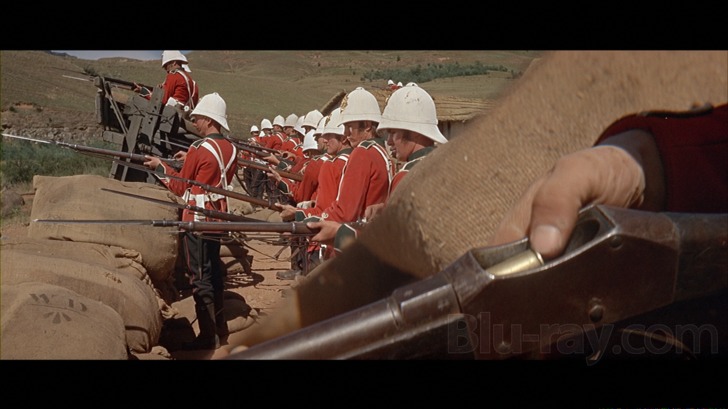
Zulu is an incredibly exciting, viscerally involving film which wisely doesn't take obvious sides, even as it quite smartly gives a good and generally historically accurate overview of the showdown at Rorke's Drift. Performances are spot on, but it's really the lush visuals (courtesy of cinematographer Stephen Dade) and the stirring battle scenes which ultimately make this film so compelling. Is this version "preferable" to the British release? That's going to have to be up to each individual consumer to decide. The British release has a better assortment of supplements but fewer audio options. Both versions have video issues which will bother various people differently depending on their individual tolerances. My personal opinion is you should certainly have one of these versions in your collection, and the film itself comes highly recommended. This release? Recommended.
Similar titles
Similar titles you might also like

Breaker Morant
1980

The Longest Day
1962

A Bridge Too Far
1977

Battle of Britain
1969

Khartoum
1966

The Dam Busters
1955

9th Company
9 rota | Collector's Edition
2005

Patton
Remastered
1970

Downfall
Der Untergang | Collector's Edition
2004

Battle of the Bulge
1965

Generation War
Unsere MŁtter, unsere Všter
2013

Into the White
2012

Glory 4K
1989

The Charge of the Light Brigade
1968

Anzio
1968

Flags of Our Fathers
2-Disc Special Edition
2006

Full Metal Jacket 4K
1987

Land of Mine
Under Sandet
2015

The Guns of Navarone 4K
1961

Journey's End
2017
